|
Message of Solidarity
His
Excellency Mr. Kofi ANAN
Secretary-general
Of the
United Nations
New
York
Dear
Sir,
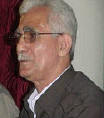 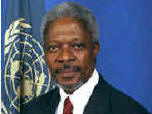 The
horrible terrorist act which brought destruction to the United Nations’
Center in Baghdad, in which dozens of its personnel lost their lives, among
them, the most notable Mr. Sergio Vieira de Mello, the high-ranking
representative of UN, is no doubt a dark crime which has been perpetrated
against all humanity. The
horrible terrorist act which brought destruction to the United Nations’
Center in Baghdad, in which dozens of its personnel lost their lives, among
them, the most notable Mr. Sergio Vieira de Mello, the high-ranking
representative of UN, is no doubt a dark crime which has been perpetrated
against all humanity.
The
brutal assault on the United Nations’ Center in Baghdad - an international
organ with a mission no other than serving the interests of Iraqi citizens
and sincere endeavor aiming at the re-establishment of peace and stability in
this country - can by no codes of morale be justified.
Accordingly, while strongly condemning this brutal immoral act, I would like,
on behalf of Democratic Party of Iranian Kurdistan and the Kurdish people in
Iran, to convey to you and the families of the victims of such a blatant
savage stunt my most heartfelt condolences.
I am
fully confident, though, incidents of this sort can never prevail over the
willpower of international community, and the United Nations will resolutely
carry on with its efforts to assist the Iraqi people to relieve themselves
from this misery.
I wish
you every success in your sacred mission.
Most
Sincerely Yours,
Abdulla HASSANZADEH
Secretary-general
Democratic Party of Iranian Kurdistan
21. 8.
2003 - Paris

A Consecrated Day and an Important Message
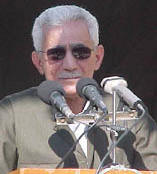 On the 16 of August
2003, the 58th anniversary of PDKI’s establishment, the
Secretary-general, Abdullah Hassanzadeh, made a remarkable speech. He, in
his speech, after highlighting a number of attributes and traits of this
Party, talked about the current conditions in Iraqi Kurdistan and said, “We
hope that the golden opportunities in Iraqi Kurdistan can become a model for
all the parts of Kurdistan.” In this part of his speech, he also stated that
“The Kurdish leadership has fostered a proud legacy for itself and its
people; however, there still exists an unaccomplished task: the Kurdish house
has not been united, the way the Kurdish nation wants.” On the 16 of August
2003, the 58th anniversary of PDKI’s establishment, the
Secretary-general, Abdullah Hassanzadeh, made a remarkable speech. He, in
his speech, after highlighting a number of attributes and traits of this
Party, talked about the current conditions in Iraqi Kurdistan and said, “We
hope that the golden opportunities in Iraqi Kurdistan can become a model for
all the parts of Kurdistan.” In this part of his speech, he also stated that
“The Kurdish leadership has fostered a proud legacy for itself and its
people; however, there still exists an unaccomplished task: the Kurdish house
has not been united, the way the Kurdish nation wants.”
The Secretary-general, in
this speech, also spoke of the current situation in Iran; after emphasizing
on the fact that “Now that the skepticism over the division of power in Iran
between reformists and hardliners have elapsed,” he expressed content that
“all the freedom activists in Iran have arrived at this conclusion that this
struggle must be diverted against the whole of the establishment, and so as
long as this government holds on to power, no real changes in Iran can be
brought about in favour of freedom, democracy, human rights and social
justice”.
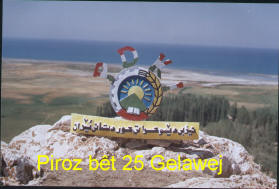 The Secretary-general
also turned to an important issue that has been the headline of Kurdish
media, and the theme of discussions among various political groups of Iranian
Kurdistan these days; the issue of forming a united front consisting of
political parties and figures of Iranian Kurdistan. In this regard too,
after referring to PDKI’s endless efforts for such an ambition, the
Secretary-general reiterated the views and polices of the Party and stated:
“Any united front must consist of all active political parties…A coalition or
a front can be realistic when it is formed by all, and each side participates
according to its weight.” In this regard, to evict some concerns, he stated,
“Kurdistan is neither entirely under the domain of PDKI, nor it is under the
domain of PDKI and any other party; Kurdistan as proven, is the centre of
struggle, freedom and democracy and pluralism. It has been like this and it
will remain as such.” The Secretary-general
also turned to an important issue that has been the headline of Kurdish
media, and the theme of discussions among various political groups of Iranian
Kurdistan these days; the issue of forming a united front consisting of
political parties and figures of Iranian Kurdistan. In this regard too,
after referring to PDKI’s endless efforts for such an ambition, the
Secretary-general reiterated the views and polices of the Party and stated:
“Any united front must consist of all active political parties…A coalition or
a front can be realistic when it is formed by all, and each side participates
according to its weight.” In this regard, to evict some concerns, he stated,
“Kurdistan is neither entirely under the domain of PDKI, nor it is under the
domain of PDKI and any other party; Kurdistan as proven, is the centre of
struggle, freedom and democracy and pluralism. It has been like this and it
will remain as such.”
The honourable Secretary-general, at the end
of his speech, reverted to the 16 of August and affirmed, “I proudly claim
that today is 58 years that the people of Iranian Kurdistan have given their
trust to our Party and have encircled its demands. We as Party activists
must strive to make this honourable relationship even stronger. Also from
this audience, I promise the people of our country that PDKI is still the
foundation of their conviction and it will remain faithful to its demands and
political objectives.”

PDKI Statement Regarding the Student Uprisings of 1999
The freedom-seeking
movement of the people of Iran has seen a fresh development in the last few
months. Those open letters that various groups and segments of Iranian
population write to the regime’s officials, to bring up to date the domestic
and world opinion, prove that there is a clear and firm confrontation between
the popular mass and the whole of the establishment. It is also clear that
the peoples’ latest uprising has no halt until the final victory - regime
change in Iran.
In this
regard, the Iranian student movement that enjoys a contented history in the
course of Iranian struggle for freedom has taken a greater and much more
active role. This year’s commemoration of the 18 Tir tragedy (July 9
1999), the ruthless crack-down of the students uprising by the dogmatic
rulers of the regime, has been considered as a new start to give the freedom
movement of students and the rest of Iran a new momentum. A few months ago,
students and many other dissident groups had decided to commemorate the
attack on students with a unique immensity to mark the foundation of a new
course of confrontation.
On the other side, the
regime’s rulers, scared to death of any freedom movement and apprehensive of
their fate, are preparing themselves in various forms to confront students
dissident movement. In this regard, to disperse students, they planned to
take final examinations a week in advance so universities can close ahead of
18 Tir. Here, the courageous and awakened students of Iran decided to
start their protests ahead of schedule, and ruined the regime’s evil
tactics. For this reason, the announcement of privatizing universities
became a premise for expressing their demands, and above all the demands of
freedom-thirsty Iranians.
Now, following
a week of student demonstrations, and despite all the crack-downs and
brutalities, the protests are in their zenith. This year’s students uprising
have some distinctiveness that either did not exist in the years before or
were less conspicuous. Among them: students demands are no longer restricted
to students solely, rather, they have mirrored the demands of all the people
of Iran; the protests, unlike the previous demonstrations, are not mainly
against the ruling elite, rather, it has attacked the whole of the
establishment. More importantly, the demands are expressed dauntlessly; they
explicitly recite the riddance of the regime and speak of surfacing a popular
administration. We are delighted and hopeful that these series of protests
are not restricted to the University of Tehran, and every day new numbers of
Iran’s universities turn into the axis of resistance, and it is evident that
before 18 Tir, all the universities of Iran will be drawn in.
On the other
hand, the people of Iran, particularly in Tehran, have decided to support
their sons and daughters decisively, and not leave them alone on their fight
for freedom and democracy. In the last week, if the regime’s vigilantes had
attempted to close down all the avenues leading to the University of Tehran
to prevent the general public joining the wave of dissident students, the
people of Tehran have turned all the city’s streets into centres of
confrontation, in a way that the whole city has turned into a large
university.
The recent
media coverage of student uprising is incomparable to previous protests;
lately, the news of student uprisings in Iran has turned into headlines of
world media. This has attracted unique solidarity within the world opinion
for the student movement and the freedom movement of the people of Iran. For
the first time, a superpower such as the United States has declared support
for the demands of the protesters and the freedom movement of the people of
Iran. PDKI along with praising the immense uprising of the students in
Tehran University and other universities of Iran, and along with offering
boundless support for the legitimate demands of the dissidents that are in
fact the demands of all the people of Iran:
-appeals to the members
and supporters of the Party in Kurdistan and other parts of Iran to support
this massive uprising and offer assistance in any way possible.
-appeals to all the
Kurdish students in all the universities in Kurdish regions and other parts
of the country to participate actively in this movement with a Kurdish
identity and strive to embody the national demands of the Kurdish people and
other deprived nationalities of Iran within the demands and slogans of this
movement. Especially, it is appropriate that the memory of July 13, the
anniversary of the assassination of our historical Kurdish leader by this
regime, Dr. Ghassemlou be coupled with the memory of 18 Tir, the
brutal crack-down of Tehran University student uprising.
-And above all, we appeal
to all the segments of Kurdish society to stand behind their young students
and participate in these protests with all their abilities that will be held
in Kurdistan universities.
-PDKI appeals to all the
people of Iran to join in hand together, and support the student uprisings,
and once for all to be done with the regime of Islamic Republic of Iran.
Meanwhile, we expect the international community to support the demands of
Iranian people for freedom and democracy more decisively, and not allow the
regime to use ‘domestic affairs’ to shed blood on the peaceful and calm
uprisings.
Democratic Party of Iranian Kurdistan
Political Bureau
17 June 2003

The Federal Court of Argentine’s Verdict renewed Iranian Regime’s disgrace
after Mykonous Trial
Juan José Galeano, the
Judge of one of the federal courts of Argentine the international warrant for
8 Iranians charged with the 1994 bombing of a Buenos Aires Jewish centre that
killed 85 people and wounded some 200. Hadi Soleimanpour, the former
ambassador in Argentine is one of these people. Last March, the Judge in
charge of the file also asked the international police to arrest four Iranian
officials in connection with this bombing. Ali Fallahian, the former
intelligence Minister that was also ordered to be arrested in 1996 in
connection with Mykonous trial, and Mohsen Rabbani, the former cultural
liaison of the Iranian embassy in Argentine are among these four people. The
delivery of the verdict disrupted relations between Tehran and Buenos Aires,
which led Iran to recall its ambassador to Tehran.
In June, newly elected
President Nestor Kirchner ordered the release of secret files of the
intelligence services related to the bombing, an action which was hailed as a
breakthrough in the case. The case has had domestic political implications
in Argentina, where former President Carlos Menem has denied a report in the
New York Times last year that he took a bribe from Iran to cover up its
involvement in the attack.
The previous Presidents were
also accused of concealing evidence to decelerate the investigation.
Asefi, the
Iranian Foreign Ministry spokesman considered the verdict politically
motivated and without any legal basis, and claimed that “all cooperation was
made with concerning bodies in regard to this case; however, it was evident
from the start that this judiciary was not going to respect the judicial
procedures.
Hadi Soleimanpour was
arrested on Thursday, 21 of August in northern English city of Durham, and
appeared at London's Bow Street
Magistrates Court to hear charges against him in the first phase of a
complicated British extradition process that would normally take months to
conclude.
Surprisingly, when the
German court was investigating the Mykonous Affair, and the government of
Iran’s involvement in this terror was becoming apparent day by day, the
regime’s foreign ministry was repeating the current claims; however, these
flaw claims were neither able to derails the process of the court nor were
they able to save the regime form humiliation at international stage.

The killing of two PDKI cadres by regime’s security forces
On Thursday, July 22,
2003 a group of PDKI cadres were on their seasonal tour of the Kurdish
regions in Iran in ‘Meraw’ region a suburb of Sanndaj, where they were
ambushed by the paramilitaries of the regime. As a result of this ambush,
two cadres, ‘Amanulah Razaei’ known as ‘Hazhar’ and ‘Shamsadin Rostami’ were
gunned down.
PDKI Cadres routinely tour
the Kurdish regions in Iran to propagate the Party’s policies, and support
the burgeoning democratic forces within the population to destabilize the
oppressive apparatus of the regime, and secure a long-term framework for the
attainment of Kurdish national rights within an integral Iran.
We send condolences to the
families of these two martyrs, and hope that their honourable course remains
well-crowded.

Zahra Kazemi’s
Murder, the continuation of
‘chain
killings’..
 In early July, the
Islamic Republic’s Foreign Policy faced several more challenges: The EU
expressed its strongest opposition to Iran’s nuclear attempts, and tied its
economic and commercial relations with Iran’s nuclear transparency and human
rights. The ringleaders of the regime finally admitted to the arrest of top
Al-Qaeda leaders after several months. As the Belgian head of state and
other leaders of the Union had declared, due to concerns over Iran’s nuclear
program and human rights violations, meeting with Khatami, the Iranian
President, were called off. Along with the meeting of the EU foreign
ministers, Khamanie, the regime’s supreme leader, in the ceremony of
delivering the ‘Shahab-3’ missile to the Revolutionary Guards of the Islamic
Republic, regarded the event as a historic movement to defend the dreams of
Palestinian people, which in turn led to Israel’s escalated concerns over
Iran’s strategic program. But, the controversial murder of Zahra Kazemi, a
Canadian photo-journalist originally Iranian, was the most innermost
challenge facing the regime in its international relations in this period.
She was murdered by Iran’s security forces, which resulted in the diplomatic
skirmishes between Canada and the government of Iran. In early July, the
Islamic Republic’s Foreign Policy faced several more challenges: The EU
expressed its strongest opposition to Iran’s nuclear attempts, and tied its
economic and commercial relations with Iran’s nuclear transparency and human
rights. The ringleaders of the regime finally admitted to the arrest of top
Al-Qaeda leaders after several months. As the Belgian head of state and
other leaders of the Union had declared, due to concerns over Iran’s nuclear
program and human rights violations, meeting with Khatami, the Iranian
President, were called off. Along with the meeting of the EU foreign
ministers, Khamanie, the regime’s supreme leader, in the ceremony of
delivering the ‘Shahab-3’ missile to the Revolutionary Guards of the Islamic
Republic, regarded the event as a historic movement to defend the dreams of
Palestinian people, which in turn led to Israel’s escalated concerns over
Iran’s strategic program. But, the controversial murder of Zahra Kazemi, a
Canadian photo-journalist originally Iranian, was the most innermost
challenge facing the regime in its international relations in this period.
She was murdered by Iran’s security forces, which resulted in the diplomatic
skirmishes between Canada and the government of Iran.
According
to ‘Keyhan’ newspaper, while in June 22, Zahra Kazemi was taking pictures
from Evin prison suspiciously, she was captured at the prison’s gate, and was
handed over to the Intelligence Ministry two day later; consequently, on the
12 of July, the news of her arrest, torture and murder became the headline of
international media especially Canadian and Iranian expatriates. Despite
Stephen Hashemi (her only son) and the Canadian government’s request to have
her body repatriated to Canada, she was silently buried in Iran. According
to ‘Roydad’ news website, “Her death is mysterious, and it is clearly an
intentional act. Her murder is an indication of continued ‘chain killings’
of writers, academics and political activists that has been in place since
this regime’s sway on power. We should not forget that the regime’s claims
of ‘investigating these killings’ have resulted in the imprisonment of
defense attorneys and lawyers such as ‘Naser Zarafshan’. One of the reason
behind the silent burial of Zahra Kazemi is the closure of this murder case,
and from the reactions of the regime’s officials, it is apparent that the
investigation of the case will also lead nowhere.
Even though Mr. Khatami
ordered the study of the incident by the Intelligence and Islamic Guardian
ministries, still the legal physician had stated that the death was the
result of a blow to her head; however, the urgent burial and rejecting the
repatriation of her body to Canada are indications that the security agents,
with the order of senior officials, have committed such a crime. The
coordination of the legal physicians and other authorities is quite
surprising because a few day before her death, in the report of the
investigating doctor sent to Stephen, stated that “Your mother’s head sculpt
has been broken and her brain has stopped functioning completely, and she is
unconscious now.” It was then the head of the international press of
Cultural and Islamic Guidance Ministry stated that the reason for her death
was a brain paralysis.
Her son in
an interview with BBC said that her mother had been detained, tortured,
paralyzed and murdered by Iran’s security forces. Even though the regime’s
authorities had stated that Zahra Kazemi had disregarded respecting
regulations and had taken pictures from restricted site, however, according
to a few other reports she had been detained while taking pictures from a
student protest, and she had died from excessive torture in Evin prison.
Saeed Mortazavi (Head of Tehran’s Courts, and also known as the ‘press
butcher’) had initially regarded Kazemi as a foreign spy student, and
considered he capture a successful operation.
It is
evident that assertion and allegations are part of the existing philosophy of
the Islamic Republic of Iran; so far a considerable number of citizens have
been killed in the unlawful courts of the regime all accused of manufactured
allegations. If the Iranian authorities are not ready to return Kazemi’s
body to Canada solely because her mother requested for her burial in Iran,
the other concealing reason is disguising the truth of this shocking
incident; the regime is concerned that the Canadian government might uncover
the truth behind this murder (through medical examination of the body) and
prove the fact that she was killed by the agents of the regime, so this crime
can be unveiled like any other crimes committed by the establishment.
However, the murder of Zahra Kazemi is another undeniable evidence of the
existence of torture, barbaric acts and human rights violations in Iran under
the authority of the Islamic Republic of Iran. It is also an indication that
the Islamic Republic and its entire establishment are incapable of reform and
incompatible with international standards.

Women Rights from the
Perspective Reflections of Dr. Ghassemlou
(On the 14th
Anniversary of his assassination)
Dr. Ghassemlou, the competent leader had lectured
much about women’s deprivations, the difficulties facing their advancement,
and the equal rights of woman and man in society in many occasions, which
have been published extensively in PDKI’s media. He had a deep understanding
of the equal rights of man and women; he believed that Kurdish woman must
stand up for her own rights. This is an excerpt of one of his speech made on
the March 8, 1988, the World Women Day.
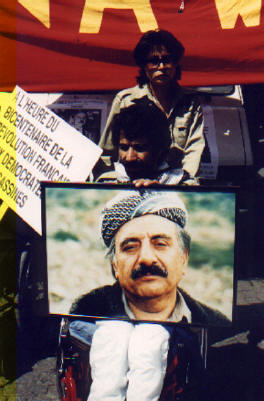 “The reality is that our country is an underdeveloped
country; however, the most deprived segment of the disadvantaged Kurdish
society is, in fact, women; their deprivation is not a sign of the
guiltiness, rather, unfortunately, the Kurdish society posses a tradition
that restricts women’s participation in the affairs and struggle of our
country. I should also add that Kurdish women, mostly, if they have the
opportunity, they do not show such a readiness so as to put the weight of
their responsibilities on their shoulders. To accomplish a major task, which
is the attainment of women’s rights, often talked about, we refer to the
difficulties facing women because these impediments exist. Coincidently, as
we speak of hardship facing Kurds, and reiterate that if Kurdish problem is
to be solved, Kurdish people must have control over their destiny and the
right to self-determination. So women’s issues are similar; they must have
the right to determine their future; if they fail to do that, others will not
bear the burden. “The reality is that our country is an underdeveloped
country; however, the most deprived segment of the disadvantaged Kurdish
society is, in fact, women; their deprivation is not a sign of the
guiltiness, rather, unfortunately, the Kurdish society posses a tradition
that restricts women’s participation in the affairs and struggle of our
country. I should also add that Kurdish women, mostly, if they have the
opportunity, they do not show such a readiness so as to put the weight of
their responsibilities on their shoulders. To accomplish a major task, which
is the attainment of women’s rights, often talked about, we refer to the
difficulties facing women because these impediments exist. Coincidently, as
we speak of hardship facing Kurds, and reiterate that if Kurdish problem is
to be solved, Kurdish people must have control over their destiny and the
right to self-determination. So women’s issues are similar; they must have
the right to determine their future; if they fail to do that, others will not
bear the burden.
Of course, one of the worst effects of the Islamic
Republic is women’s increasing deprivation. This does not mean that they
were better-off and equal in the previous regime; however the reality is that
now under the Islamic Republic, women that were most active and engaged in
various segments of society, have now been forced into the kitchens, and have
in fact been imprisoned under the black cover. Now if our Iran is a prison
for every Iranian and all the oppressed nationalities, it is a larger prison
for our sisters. As a result, the struggle for women’s freedom and their
rights for self-determination are in no way apart from the struggle of our
people for democracy and autonomy.”
Whenever democracy has spread and nations have attained
their full rights, women have also secured more freedom. The struggle for
women’s rights is even lengthier than achieving autonomy. Of course, we all
know, and we have stated repeatedly that the struggle for autonomy might be
very long; however, the struggle for women’s rights goes beyond autonomy.
Our sisters, particularly the younger generation must prepare themselves for
the days ahead to keep the torch of struggle stand still.
In our organization and political strife, we must
devote a special portion to women who consist of half of the population. As
you know, our Party respects the full rights of women along men; however,
injecting this into a larger society needs much more efforts. This distance
must be eventually eradicated. In our opinion, the more women participate in
social and political life, the more developed the society will become, and
the more women engage in the political movement of a nation, the more
advanced that movement and the mounting chances of its victory.

Amnesty International
(AI) Annual Report on Human Right conditions in Iran
A Few Words
AI in its latest report
(2003) for the period of January to December 2002 has highlighted several
instances of human rights violations such as arrest and detention of
political figures, students, journalists, and academics, unlawful trials for
the detainees and preventing them to have access to lawyers or family
members, violations of freedom of expression and association by the
judiciary, execution and stoning. The report also views the intensifying
political and social tensions during the year, and the rivalry among the
camps favouring social reform and the hardliners adversely affecting the
human rights under the reign of the regime of Islamic Republic of Iran.
The judiciary, one of the
institutions under the control of the hardliners and run by the supporters of
‘Velyat-e-Faghih’, according to this report, “has responded to expressions of
social and political criticism with mounting curbs on freedom of expression
and association, including arbitrary arrests; politically motivated
prosecutions of students, writers, academics, members of parliament and
prominent advocates of reform; and the arbitrary closure of pro-reform
publications. Unfair trials, especially of such people, as well as torture
and televised "confessions" continued to be reported. The judiciary used the
death penalty and judicial sentences of flogging as a means of punishment in
cases relating to freedom of expression.”
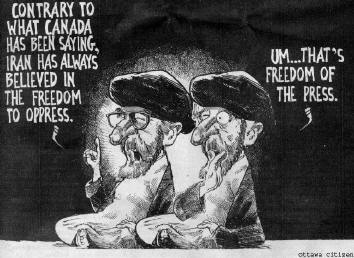 It is close to a
century that the written fundamental rights of Iran recognizes freedom of
press as a legitimate right for the people; however, almost all experts agree
that within the last 100 years, except a few short periods, the people of
Iran have basically not enjoyed any thing of ‘freedom of press’; especially
after the revolution of 1979, we have witnessed repetitive violations of
freedom of press, the closure of papers, detainment of publishers and
writers, and finally torture and judicial agony. In more than twenty times
of listing the regime of Islamic Republic in the group of human rights
violators by the international community, the breach of the freedom of press
has also been the prime offence committed by the regime. In the recent
report titled ‘Attacks on freedom of expression and association’ has been
inserted ‘Scores of students, academics and journalists were arbitrarily
arrested and many faced politically motivated criminal charges based on
defamation or security laws. Trials in this context usually fell short of
international fair trial standards and continued to be heard in special
courts and frequently behind closed doors, resulting in the imprisonment of
people solely on account of their beliefs. Many of the arbitrary arrests of
student leaders in January and November were carried out in the manner of
abductions, with several students "disappearing" for days. Prisoners of
conscience, such as student leader Ali Afshari, faced new charges apparently
designed to prolong their imprisonment. Others were released only to be
immediately rearrested.’ It is close to a
century that the written fundamental rights of Iran recognizes freedom of
press as a legitimate right for the people; however, almost all experts agree
that within the last 100 years, except a few short periods, the people of
Iran have basically not enjoyed any thing of ‘freedom of press’; especially
after the revolution of 1979, we have witnessed repetitive violations of
freedom of press, the closure of papers, detainment of publishers and
writers, and finally torture and judicial agony. In more than twenty times
of listing the regime of Islamic Republic in the group of human rights
violators by the international community, the breach of the freedom of press
has also been the prime offence committed by the regime. In the recent
report titled ‘Attacks on freedom of expression and association’ has been
inserted ‘Scores of students, academics and journalists were arbitrarily
arrested and many faced politically motivated criminal charges based on
defamation or security laws. Trials in this context usually fell short of
international fair trial standards and continued to be heard in special
courts and frequently behind closed doors, resulting in the imprisonment of
people solely on account of their beliefs. Many of the arbitrary arrests of
student leaders in January and November were carried out in the manner of
abductions, with several students "disappearing" for days. Prisoners of
conscience, such as student leader Ali Afshari, faced new charges apparently
designed to prolong their imprisonment. Others were released only to be
immediately rearrested.’
The report, in this
part, has also mentioned the 7 years imprisonment sentence of Hojjatoleslam
Hasan Yousefi Eshkevari, the 96 years jail term for members of Milli Mazhabi
(national-religious association), the death sentence and the 74 lashes for
Hashem Aghajari, and finally Mohammad Ali Dadkhah’s 5 year sentence and the
ban from practicing law for 10 years in connection with the defense of his
clients.
Under the medieval
authority of Islamic Republic, set aside the defendants, the defense attorney
have also not been exempted from prosecution. Their offence, also ‘spreading
lies’ and defending those who have been dragged to courts in connection with
their freedom of speech and association. In a regime that certain lawmakers
are not immune from prosecution, imprisoning defending lawyers must be a
usual business. The report, in this regard, titled ’Lawyers and human rights
defenders at risk’ states ‘Lawyers, who require authorization from the
judiciary to practice law, continued to face judicial harassment. Those known
as human rights defenders were particularly targeted. Lawyers were
occasionally contacted by judicial representatives and told not to represent
certain people or face a summons.” The report, in this section, has referred
to the trial of 6 people, including Mohammad Ali Dadkhah and Abdolfattah
Soltani, “all of whom had defended cases concerning freedom of expression and
association, were charged with vaguely worded offences such as "spreading
lies" in connection with the carrying out of their professional duties. After
trials that violated the laws governing the legal profession, they received
sentences that prohibited them from practicing law and included prison terms,
often suspended.”
In a totalitarian state
such as the Islamic Republic of Iran, acts of torture and ill-treatment to
create fear and terror, and extract confessions from the victims are
legitimate. The usage of force and torture from the first day of this regime
till now has been going on in various forms, and it has also taken a much
broader scope, where many of the victims have lost their lives, due to
excessive physical beatings. This time too, AI, as previously, has exposed
the acts of torture and ill-treatment and stated “Torture and ill-treatment,
including of prisoners of conscience, continued to be used, usually in cases
where judicial or security officials denied detainees access to lawyers and
relatives…The death penalty and cruel, inhuman and degrading punishments were
used against people charged for trying to exercise their rights to freedom of
expression and association. At least 113 people, including six women, were
executed, many in public. At least two people were reportedly executed by
stoning and at least one execution was broadcast on television. As in
previous years, there was a surge in public executions and floggings between
July and September. At least 84 people were flogged. The true numbers of
executions and floggings may have been considerably higher. Political
organizations, for example, reported that 450 people were executed in 2002.”
Even though, this report
does not narrates the notorious extents of continuous violations of human
rights in Iran, the fact is that the violation of human rights in Iran is not
just a practice; rather, the fundamental roots must be sought in the
political-legal structure of the Islamic regime’s religious establishment.
The Constitution of the system is an evident document of legal discrimination
and oppression.

SOCIALIST INTERNATIONAL CONFERENCE:
 
Leaders and representatives of a dozen
of the main Iraqi political parties, incorporating different sensitivities
and identities forming Iraqi culture and society, participated in the
Socialist International Conference 'Building Democracy in Iraq - Working
for Peace in the Middle East' held in Rome on 18-19 July. Israeli and
Palestinian political leaders and delegates were equally present to address
current developments and prospects for moving forward the peace process in
the region. The meeting, hosted by the Democrats of the Left, DS, whose
delegation was headed by its General Secretary Piero Fassino and President
Massimo D'Alema, and the Italian Democratic Socialists, SDI, led by Chair
Enrico Boselli, was chaired by SI President António Guterres.
Members of the Iraqi Governing Council present at the Conference for their
first international activity since the establishment. A message to the
Conference was also received from Sergio Vieira de Mello, Special
Representative for Iraq of the United Nations Secretary-General.
The first day of debates continued the dialogue undertaken by the Socialist
International mission in Baghdad in mid-June and was organised into five
different panels covering some of the essential elements for building
democracy in Iraq. The first concentrated on 'From dictatorship to
democracy: creating the new institutions’, the second panel on
'Guaranteeing human rights and fundamental freedoms for all Iraqis', the
third panel was 'Civil society and women’s participation in the political
process', the fourth 'For a future of inclusion: empowering people in a
multi-ethnic, multi-religious and multi-cultural society', then the fifth
panel 'Regional and International perspectives for the new Iraq'.
Conclusions of the meeting, 'A strategy for a sustainable democratic, free
and united Iraq', were presented by DS President Massimo D'Alema.
Discussions on the second day, centring on 'Working for Peace in the Middle
East', were introduced by Piero Fassino, DS General Secretary, followed by
Thorbjřrn Jagland, Chair of the SI Middle East Committee (DNA, Norway) and
counted with the participation of Shimon Peres, Chair of the Israel Labour
Party; Yossi Sarid, Leader of Meretz, and Nabil Shaat, Foreign Minister of
the Palestinian Authority, as well as representatives of other Socialist
International member parties.
In this part of
his speech Mr. Jagland referred to the importance of democracy in Iran and
stated: “In 1979, the people of Iran in general rose up for freedom and
democracy. This coincided with the meeting of Socialist International
in Oslo, where a number of distinguished figures were present at the
meeting who are not in our warm gatherings any more. The revolution
that started in 1979 was aimed at bringing freedom and democracy;
regrettably, as we all know a handful of ‘reactionaries’ took power, and we
witnessed that instead of freedom and democracy, tyranny ruled over the
country. However, now we encounter the 1979 circumstances, meaning
that the people of Iran, in general, are in favour of fundamental change to
evict dictatorship and establish freedom and democracy. We as the SI
must fully support the democratic forces of Iran for realizing these
precious objectives, because if freedom and democracy are well-established
in Iran, it will have direct effect on the whole of the region.”
In this
conference, the PDKI representative abroad, Dr. Khosrow Abdullahi presented
a speech on the situation of Iran. António Guterres welcomed the
speech and ascertained that there are dictators in the region, and stated
that SI is the supporter of democratic forces, and you must count on our
assistance.
Dr. Abdullahi’s Speech
Dear President,
Ladies and Gentlemen,
Dear friends,
Before I begin, allow me
convey the warm greetings of the PDKI leadership, particularly the
Secretary-general, Abdullah Hassanzadeh, and wish your Conference success and
fruitful results.
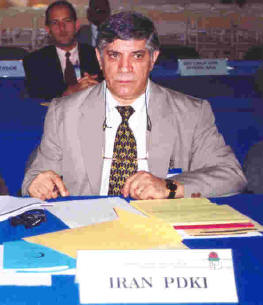 Friends and comrades! We
as a political movement representing a segment of Iranian society, the Kurds
of Iran, are delighted that the issue of democracy in Iraq and the peace
between the Israelis and Palestinians have attracted the attention of the
world community in general and IS in particular. However, as you all know,
there are countries in the region that are desecrated with dictators, where
no signs of democracy are evident nor human rights are respected, Iran being
one of them. It has been a quarter of century that people in Iran live in
tyranny. Extrajudicial executions, mass killings and disappearances,
systematic imprisonment and torture, public executions have become part of
daily life of different segments of society in general and writers,
journalists, academics, defense attorneys, students, women and ethnic and
religious minorities, especially the Kurds and Bahaias. I will only refer to
a few cases: Friends and comrades! We
as a political movement representing a segment of Iranian society, the Kurds
of Iran, are delighted that the issue of democracy in Iraq and the peace
between the Israelis and Palestinians have attracted the attention of the
world community in general and IS in particular. However, as you all know,
there are countries in the region that are desecrated with dictators, where
no signs of democracy are evident nor human rights are respected, Iran being
one of them. It has been a quarter of century that people in Iran live in
tyranny. Extrajudicial executions, mass killings and disappearances,
systematic imprisonment and torture, public executions have become part of
daily life of different segments of society in general and writers,
journalists, academics, defense attorneys, students, women and ethnic and
religious minorities, especially the Kurds and Bahaias. I will only refer to
a few cases:
From
January 2003 to May 2003, at least 250 people have been executed. Within the
last year, more than 100 newspapers and journals have been shut down and
their editors and owners have been put on trial, and a considerable number of
these people have been sentenced to imprisonment and public beatings. Just
in July, 6 more journalists, among them, Mr. ‘Sahar-Khiz’ have been detained
accused of ‘activities against the regime’ and sent to prison. According to
our sources, the numbers of journalists that currently live behind bars are
23 people. Another journalist, Ms. Zahra Kazemi, an Iranian with Canadian
citizenship who had been detained in Iran, died under severe beatings and
torture. Finally, in the process of latest student demonstrations supported
by the people, according to official figures more than 4000 people have been
detained, where 2000 of them are still in custody. In regards to the victims
of state terrorism of the Islamic Republic internationally, I will remain
silent, because you are all aware of it. I only remind you of the
assassination of the Party Secretary-generals, Dr. Ghassemlou and Dr.
Sharafkani and five of their associates after the meetings of SI, the first
in 1989 in Vienna, and the second in 1992 in Berlin by the terrorists of the
regime of Iran.
Friends and comrades! In
these difficult circumstances it is appropriate if we expect the SI to
declare its full support and solidarity with this difficult, but brave
struggle, which the people of Iran are carrying for freedom, democracy and
human rights.
I appreciate your patience
Iranian Kurd Refugee
Crisis: Three Responsible Parties
03 September 2003 -
KurdishMedia.com - By Agit Can
The
current Iranian Kurd refugee crisis is a result of active and/or passive
crimes committed by three parties who are anything but strangers to the
trials and tribulations of the persecuted Kurdish nation.
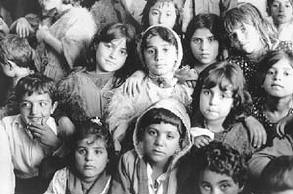 Turkish
police, presumably acting with at least tacit approval from the Turkish
government, are forcibly deporting Iranian Kurdish refugees, sending them
back to Iran from whence they fled. The majority of these refugees are
members of the Democratic Party of Iranian Kurdistan (PDKI) or party members’
families. The Turkish police are deporting these refugees with full knowledge
that, immediately upon entering Iran, they will be arrested and face
incarceration accompanied by torture, and, perhaps, execution to follow. Turkish
police, presumably acting with at least tacit approval from the Turkish
government, are forcibly deporting Iranian Kurdish refugees, sending them
back to Iran from whence they fled. The majority of these refugees are
members of the Democratic Party of Iranian Kurdistan (PDKI) or party members’
families. The Turkish police are deporting these refugees with full knowledge
that, immediately upon entering Iran, they will be arrested and face
incarceration accompanied by torture, and, perhaps, execution to follow.
Both Turkey
and Iran are signatories of 1951 International Convention on the Status of
Refugees and the 1967 Protocol, an additional convention to safeguard the
rights of refugees. The most basic right of refugees is that they be
protected from being forced to return to situations of danger. However,
Turkey is ignoring its obligation to do just that by returning these Iranian
Kurds to their oppressor and showing no regard for the inevitable
consequences of doing so.
The Iranian
Kurd refugees attained refugee status while in Iraqi Kurdistan. Little
security was available for them in Iraqi Kurdistan, as Iranian agents had
infiltrated this autonomous area bordering Iranian-administered territory.
Thus, these refugees were forced to flee to a third state, Turkey. Turkey has
demonstrated that it has no interest in providing even temporary safe haven
for the refugees, and the United Nations High Commission for Refugees (UNHCR)
has yet to take any steps to help these refugees as the Turkish police return
them to their persecutor. A major humanitarian disaster is happening at this
very moment, and the world is closing its eyes and turning its back.
“We are
demanding that Turkey respect the fundamental rights of refugees in general
and Iranian Kurdish refugees in particular, which means offering them at
least temporary safe haven within Turkey,” says Sharif Behruz, Canadian
Representative of the Democratic Party of Iranian Kurdistan (PDKI). “Turkey
is taking advantage of the inactivity of the United Nations to do this to the
refugees. If the United Nations High Commission for Refugees (UNHCR) had
acted earlier and taken more positive measures regarding these refugees, then
they would have been settled in a third country with no problem. Due to this
inaction, Turkey is much freer to decide how to deal with the refugees. The
Iranian government has a history of ill treatment of prisoners, especially
Kurdish prisoners. These asylum seekers, as prisoners, will be regarded as
infidels and counter-revolutionaries, and will face life in prison if not
execution. The Iranian regime also has a history of searching for these
asylum seekers who have fled Iran and we are appealing to the Iranian
government to respect their rights as well.”
If the
ongoing crime against the Iranian Kurdish refugees, currently being
perpetrated by the Turkish and Iranian regimes, is allowed to continue with
nothing but silence from the UNHCR, an unhealthy precedent will be set for
the millions of refugees throughout the world.

US sets sights on Iran
By Roger Hardy
BBC Middle East analyst – 30 July 2003
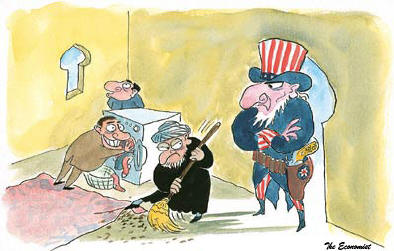
In the first piece in a
special four-part series on the United States and Iran, Roger Hardy looks at
the debate in Washington over how to deal with the Islamic regime.
The Bush administration
has been piling up the pressure on the mullahs who rule Iran - accusing them
of sponsoring terrorism, developing weapons of mass destruction and denying
freedom to their people. But does the United States favour a change in the
regime's behaviour - or a change of regime?
There has been a distinct
toughening of the US administration's attitude to Iran ever since President
George W Bush famously declared it part of an "axis of evil" 18 months ago.
In the eyes of this
administration, the Iran of the ayatollahs - like North Korea and Saddam
Hussein's Iraq - is guilty of two main things, which in Washington's view are
interrelated - supporting terrorism and developing weapons of mass
destruction. And it's above all the recent evidence about Tehran's nuclear
programme which has made Iran a hot issue in US policy-making circles.
Nuclear programme
Michael Eisenstadt is a
military expert at the Washington Institute for Near East Policy, an
influential think-tank: "This has been a major issue for US policy-makers
for at least the last decade. However, recent revelations - prompted by leaks
by an Iranian opposition group, which were then confirmed by the US
Government - have led people to conclude that Iran is a lot further along on
its nuclear programme than previously believed. "Some people believe that
perhaps within two or three years the Iranians might have enough fissile
material to produce their first bomb. On the other hand, there are US
Government estimates which say that we're talking about a timeframe toward
the end of the decade," he says. "So it's not clear exactly when the
programme might bear fruit. What is clear is that if the programme is to be
stopped, action has to be taken now," he says.
But what action? The
administration is sharply divided between the so-called "realists" - who
favour using concerted diplomatic pressure on Iran - and the hard-liners,
known as "neo-conservatives" or "neo-cons", who favour "regime change".
One of the well-known
neo-cons is Joshua Muravchik of the right-wing think-tank, the American
Enterprise Institute. He links the need for democratic change - not only in
Iran but throughout the Middle East - directly to the 11 September attacks
against New York and Washington. "I think that what hit home to Americans at
9/11 was that we have to, not just retaliate, but really try to defuse this
threat. And I think that the terrorism - Middle Eastern terrorism - comes out
of a poisoned political culture," he says.
'Replace
tyrannies'
For the neo-cons, the tyrannies of the
Middle East must be replaced with democracies, preferably by peaceful means -
but they don't rule out the use of force.
The
first phase in this process was the toppling of the Saddam Hussein regime in
Iraq. But - as Judith Yaphe of Washington's National Defense University
explains - the neo-con agenda extends well beyond Baghdad: "I think that
Iran, yes, is clearly the target that many of the neo-cons have in mind.
First we're going to do Iraq - and then there's Iran, and there's Syria.
"But on that list also is Saudi Arabia, the Gulf states and ultimately even
Egypt. All of the map of the Middle East was to be re-made in the shape of
what Iraq would be - ie democratic," she says. "Well, Iraq isn't going to be
what they would like it to be, at least for quite a long time. Does that
change their perspective? I don't think they always have a strong sense of
reality," she says.
Unresolved
debate
The debate between the realists and the
neo-cons is often fierce, and it's unresolved. The result is that the
administration speaks with different voices. The neo-cons are pleased
when President Bush speaks out - as he has repeatedly - in support of Iranian
students demonstrating for greater freedom. In contrast, the realists
applauded when Secretary of State Colin Powell recently said the factional
fight in Iran - between reformists and conservatives - was a family quarrel
in which America should not intervene.
George Perkovich of the
liberal think-tank, the Carnegie Endowment for International Peace, believes
there is a fundamental contradiction in policy-making. "There are people who
say, 'Let's try to make an arrangement, get a deal with the Iranian
Government to stop its nuclear programme, give up these facilities that
concern us - and we'll probably have to reassure them in various ways in
order to get that arrangement'," he explains. "There's another group in the
administration which says, 'No, we don't deal with satanic regimes. The
government of Iran is evil - we don't deal with them. We don't negotiate with
them, we don't offer them anything. We want them to leave.' "And so that
conflict - between dealing with these people and saying 'No, they should just
leave, there should be regime change' - makes US policy incoherent," he says.
One of the issues on which
the two groups fail to see eye to eye is the question of how durable the
current Iranian regime is - and what the alternatives to it might be.

Iranian Kurdish refugees in the Al Tash camp in Iraq
KALAR, Iraq, July 8 (UNHCR)
– Things went from bad to worse for the Iranian refugees at the Al Tash camp
outside Baghdad the day the government of Saddam Hussein fell in April. The
three-month food ration the refugees of Kurdish descent received ran out in
June. There was little water and electricity. And day and night gunfire and
grenade blasts echoed through the camp. "We feared for our lives," said a
35-year-old car painter who calls himself Mansoor who left the camp over the
weekend. He came to Kalar district, 140 km to the south of Sulaymaniyah in
northern Iraq, over the weekend to look for a house to rent and then fetch
his wife and two children he left at Al Tash. Mansoor is one of the 405
Iranians from Al Tash who local authorities say arrived in Kalar over the
past several days. They say a steady exodus of refugees from Al Tash has been
taking place because of the deteriorating situation in the facility caught in
one of the more unstable areas in Iraq between the Coalition and well-armed
Iraqi gunmen reportedly loyal to the old government.
The arrivals at Kalar say
that of the 10,000 to 12,000 refugees at Al Tash before the war only about 25
percent remain, and they expect the rest to pack their bags soon unless aid
agencies are able to help them leave. The area around Al Tash is currently a
no-go zone for aid workers. When UN refugee agency staff visited the camp in
late June, they were told that up to 500 Iranians were leaving the camp daily
and moving northwards toward Sulaymaniyah. A UNHCR team travelled to Kalar
on Tuesday (July 8) to look into the situation of the arrivals from Al Tash
and ask them what their plans were. The refugees appeared to be in good
shape. They were staying in rented houses or with relatives. They said they
could not return to Iran for various reasons – mainly political – and planned
to remain in the meantime at Kalar, a town of about 100,000 in a region
populated mainly by Iraqi Kurds. "We have identified relocation sites for
the Iranian refugees at Al Tash," says Iraj Imomberdiev, UNHCR's head of
office in Sulaymaniyah. "We are prepared to receive them in these sites as
soon as it is reasonably safe for us to transfer them." The local authorities
approved the relocation sites and the movement of the refugees into the area.
UNHCR staffer Kamaran Ali
said the agency is caring for some 3,500 Iranian refugees in Sulaymaniyah and
Erbil, providing food ration cards, medical aid, funds to subsidise their
rent and cash assistance for the most vulnerable. For now, humanitarian
activities are extremely limited in Al Tash camp because of the continued
security risks.
The camp houses Iranians
who left their country after the fall of the Shah in 1979 and during the war
between Iraq and Iran from 1980 to 1988. The former government established
the camp in the mid-1980s to gather all the Iranian ethnic Kurds in the
country in one place. Some of the residents in the camps were refugees
recognized by UNHCR. Mansoor, who was forced to flee with his family after
the Islamic theocracy took over his country, was one of them. Others were
driven into Iraq during the initial stages of the Iraq-Iran war.
Because the Iranian Kurds
were treated well by the old regime, they had been the object of resentment
among the Arabs and subjected to violent attacks and robbery after the
collapse of the previous government. "It was getting worse by the day, so I
just decided to pack my family along with 30 other people in a pickup truck
and left," said Jalal Wali, who left Iran in 1985 and never returned. "We
were threatened all the time by the Iraqis. We had to go." Mansoor said that
before the war, he used to sell perfume and toiletries from house to house,
getting his merchandise on credit. He earned well, but since the end of the
war, he has not ventured out of the camp because the Iranians have been
attacked and robbed by Iraqi Arabs.
Many of those who fled Al
Tash have reportedly slipped into Iran, but many of the arrivals feared
venturing on the other side of the border, which is littered with land mines
from the war. The frontier also is heavily militarized. The refugees say
they have received recent reports of two returnees killed, but these reports
could not be confirmed. For the moment, their biggest concern is getting
settled and finding jobs. "We need help from God, but we also have to find
jobs," said Mansoor.
© UNHCR/K.Nagasaka

click here to see the back
cover |